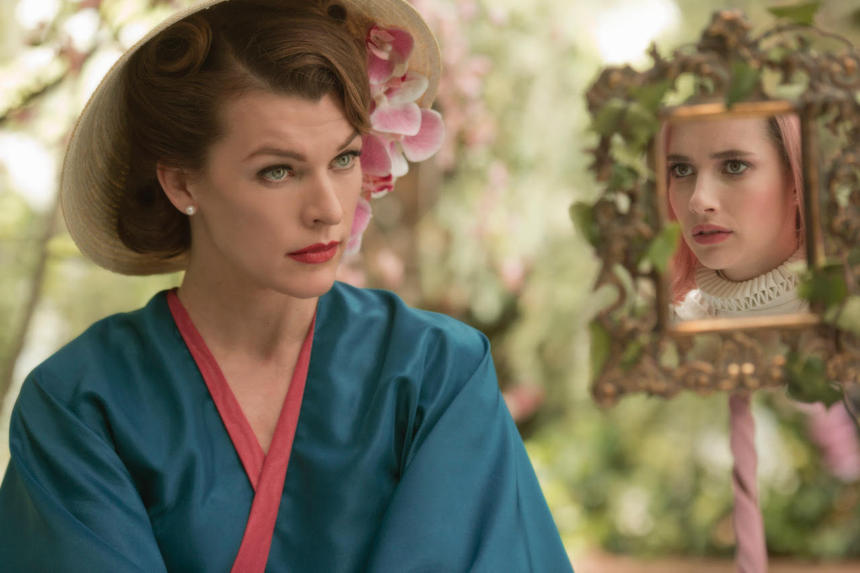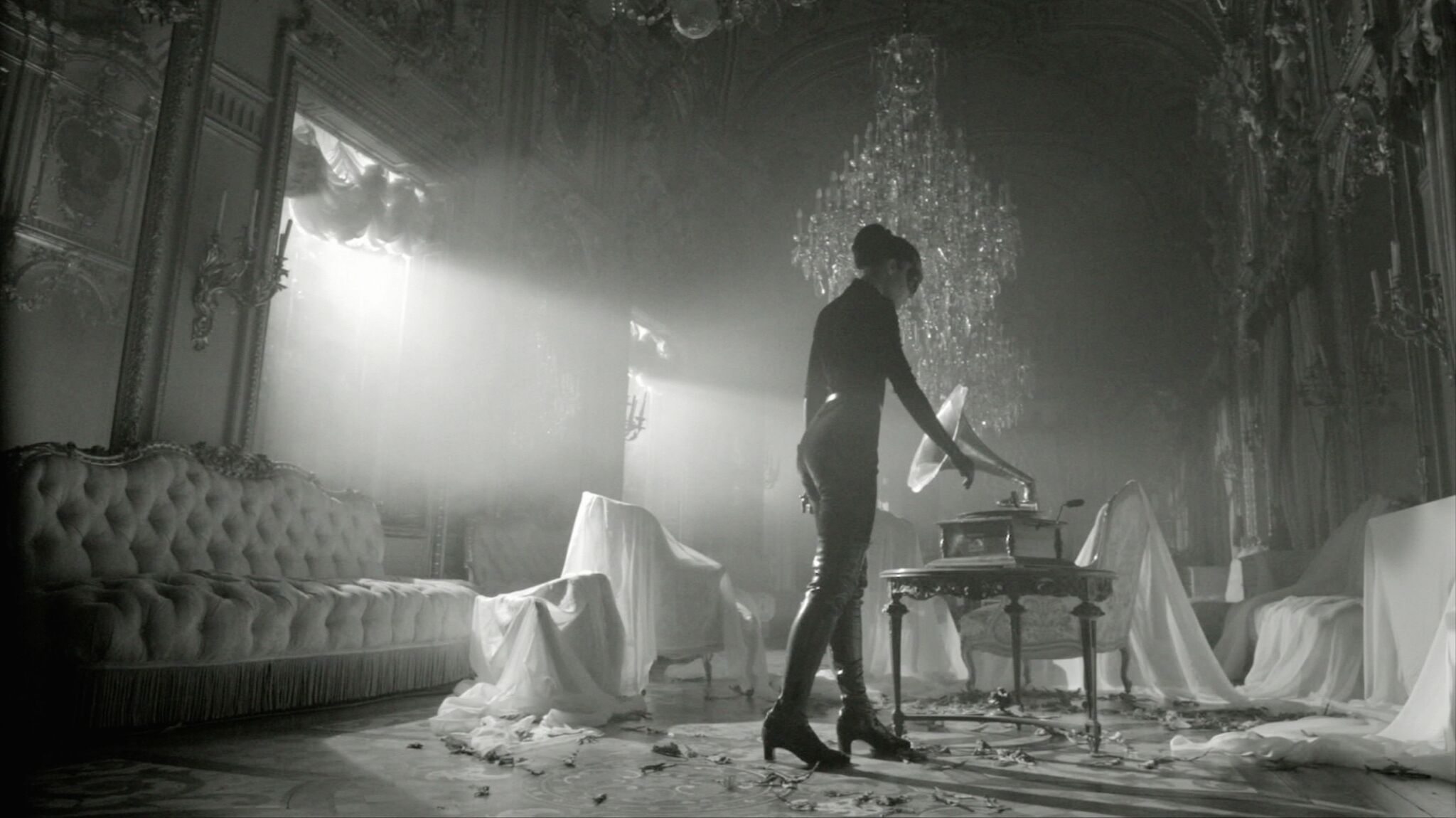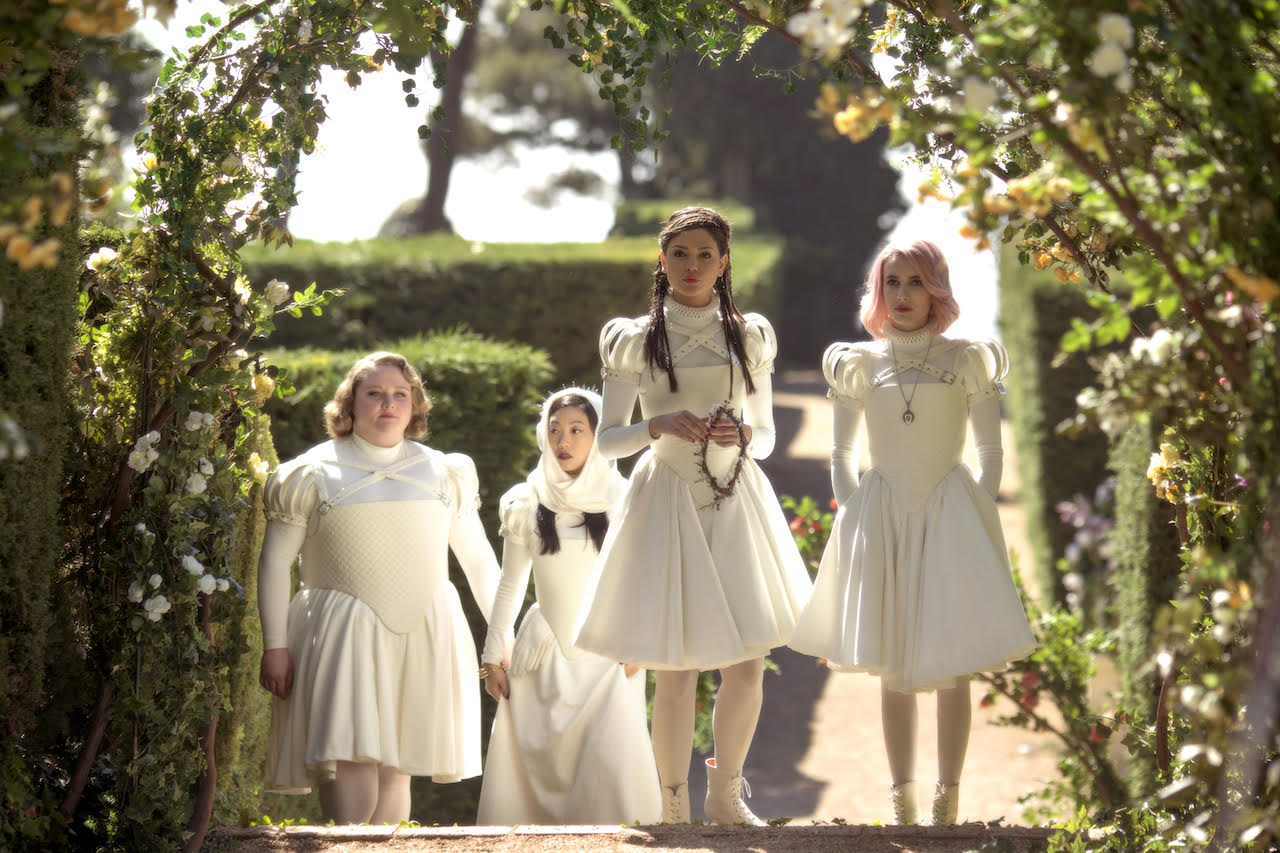Sundance 2019 Interview: PARADISE HILLS Director Alice Waddington Talks About Her Wonderland

As a curator for Slamdance’s Department of Anarchy, I make a point of seeking out weird and wonderful films from around the world. One of my favorites from 2016 was Alice Waddington’s Disco Inferno. Even by our high standards, the short displayed a virtuosic command of production design, costuming, and cinematography with a delightful retro vibe that recalled Hammer Horror with a dash of surrealism.
The success of Disco Inferno led to her debut feature, Paradise Hills, a project that made significant buzz at the Fantastic Market a few years ago.
Without giving away too much, the picture follows a young, rebellious, upper-class woman sent to a rehab/brainwashing facility that transforms its patients into Stepford Wives. Additionally, this plot unfolds within a lush, imaginary universe of flying cars and holograms with a dizzying array of references to haute couture and art history.
On a visual level, the result is staggering. As a story, the reaction has been mixed among audiences. The messaging about female objectification and male gaze is delivered with the subtlety of a sledgehammer. However, the work needs to be accepted on its own terms. When I asked Alice if her film was an allegory, she gave me an unequivocal “yes.” And, perhaps, for the YA viewers for whom this film is partly intended, that is not a bad thing.
In any case, the film just premiered at Sundance 2019 and I had a chance to sit down with Alice and chat with her a bit about what looks to be a highly promising career.
This is your debut feature but it reflects a highly creative and sophisticated understanding of costuming and production design. What experiences led you to this level of proficiency? What is your professional background?
I began as a costume designer and also interned in camera departments for several films. From the ages of 16-21, I had worked in some 12 features and short films. Even though my parents had no industry background, they have a friend from university that did.
He’s a Director of Photography by the name of Quique López. And the first film we did together went to the Berlinale! Which was bonkers. That made me realize you could make something with your pals in an intimate setting like your hometown, yet it could have international repercussions…
My other background is in photography. At 18, I was one of the youngest photographers shooting for the Spanish edition of Harper’s Bazaar. I was just trying to see where the discipline would take me. Then, an agent that I had at the time in Spain for fashion photography encouraged me to begin working with DSLR video, and I started making fashion films.
Another thing I had been developing was costume design. I participated in the design of costumes in films such as Magical Girl, which won at the San Sebastian Film Festival.
I realized that the key to creating something that people loved was to just make something that you adored; something that you were passionate about.
Calling the setting of your film “lush” would be an understatement. Could you tell us a bit about the locations used in the film? Did they inspire your story?
Our locations were mainly in Barcelona and the Canary Islands. They ranged from Brutalist palaces that housed architects, to ochre cliffs in the Mediterranean coast.
There’s also an homage in the film to the modernist architecture of Barcelona – which looks like gloriously melting Art Nouveau – and to Spanish Middle Eastern interiors.
For example, the speaker that you can see in the Residence’s Meditation Room is a gigantic reproduction of a Modernist spyhole that I photographed in a building and pinged to our female production designer, Laia Colet.
The process of selecting these locations was truly creative, because we were crafting a fantasy world from scratch. There’s only two digital locations in the film: the ballroom that opens the feature – which was shot on green screen – and the scenes that were shot in the ocean. All the others were practical sets. For instance, the room I was mentioning above was a Gran Canaria parking lot to which Colet added real grass and some panels with boschereccia or wooded gardens painted on them! Spanish resourcefulness.
How long did you scout?
Easily for four months. Also, Laia Farran’s (female head of locations) work in this film is remarkable too. I gave her a 23-page document that became hilariously well-known within the Spanish production world, because it shamelessly described every single location in the script using some three to five Spanish options for it, plus paintings, film screenshots and other images that could help the team in any way. But Farran had to turn it inside out to find spots where we actually could shoot!
Definitely, one of the unsung heroes of this film.
That document also happened to be a good base for the pre-production Pinterest board that I shared with the Production Design department, and later on even with our heads of makeup. We wanted the eyeshadow matched to the wall, matched to the gown; so everyone needed to be in sync (laughs)
Could you tell me just three films that inspired your film?
Picnic at Hanging Rock, The Princess Bride, and… the British TV Series The Prisoner!
I was a big fan of your previous short DISCO INFERNO. It was late last night, but I seem to recall the repetition of certain motifs such as the creeping vines in the rose garden. Is PARADISE HILLS part of the same universe you began in DISCO INFERNO or is it something else?

Ah, yes, I did steal from myself!! Beyond the visuals we already discussed, both films are about women who are trapped. Disco Inferno was about a woman who’s unhappy with her job and condemned to do it over and over again for all eternity.
And Paradise Hills is about women who truly want to be themselves, who they are, when their environment simply won’t allow it. In some cases, their parents. In some cases, their partners. And they want to change them into their idea of a woman that doesn’t really exist.
Did any of the visual ideas of your film come from dreams?
I am a terrible dream journaler. I tried for a while and it was utterly impossible. I’d say my ideas come from daydreams instead. I was always that kid doodling in their Spanish textbook. I also think it’s empowering to own up to my ideas in a way that is conscious as possible.

Of the group of teens at the Paradise Hills “Residence,” do you identify yourself with one of them in particular? Or all of them?
Here’s the easy answer. Directors often identify with their protagonists. And I think that a few girls will see themselves in Uma’s relationship with her mother, and in the pressure to discover their ideal persona maybe too early on in life.
I do think it’s really important to tell women that they can and should take care of themselves when plausible and possible. I adore men— they’re my partners, my friends and my family. But that does not exclude the idea of being your own hero, or your own knight in shining armor, if you will.
Does your film echo any particular experience from your youth? For instance, did you ever break curfew? Was there anything from the film that replicated an episode from your teenage years?
First of all, I wanna set the record straight: I was a terrible teen (laughs). Wait, disclaimer: I was an extremely good, bookish teen with flawless grades until I was 15. But from then on, and probably because of how nerdy I still was (am?), I would try and prove any remaining toughness by having some bad friends, running away with them while telling my parents I was studying at a childhood friend’s house…
My parents were also then trying to understand the fact that I am a Queer person. I was living under constant inner turmoil and would bind my chest, cut my eyelashes, and to top it all off, I was obsessed with getting into a band called ‘Killer Crab Louses’.
Nowadays, I just watch my best friend drink red wine with her cats at home and direct films for that same teenaged self; that really just wanted to fit in. With Uma herself fleeing her home, it’s a bittersweet moment, but not a moral tale — just a natural reaction to having one’s freedom restricted.
Is your film an allegory?
Visually, it’s one allegory after another. One could say there might be one too many! (laughs) It’s like a fairytale or a bedtime story, with a strong message of coming together as women, to rescue ourselves.
Whether you like it or not, you’ll hopefully identify with the plight for identity that Uma suffers through. She wants to find the people who will love her for who she actually is, instead of having to change as her social entourage seems to want her to.
What is your attitude toward camp and melodrama? Is that a part of this film?
Oh yes, yes, our feature really is kitschier than Liberace's entire piano collection, and that's utterly intentional. I wanted to take fairytale resources from films like The Princess Bride and crank them up to eleven. Our feature is meant to be a fun adventure for our younger selves, sparing the cynicism of adulthood.
For example, I've heard our film compared to The Handmaid's Tale, which I love; but Paradise Hills is so much softer, and campier. It would be like comparing Transformers to The White Ribbon. Both are awesome in their own ways, but I would not personally dare put them in the same box.
I also think it’s cool how the Residence is so beautiful yet the characters feel immediately skeevy about its methods. You know how some of the nicest neighborhoods by day become the most terrifying at night?
Some of the villains in your story are maternal figures. I’m sort of curious where power and control of the female body originates in your imaginary universe. Is it the product of male desire, or is it a complex form of self-observation?
The entire story is indeed about institutional, physical and mental control of men and women through an impossible idea of perfection. This message is very much for our young folks. They’re very exposed to this brand of poison, because of the constant presence of social media in their lives.
And we just want to tell them there’s no such thing as a perfect man or woman.
Infantilization is a common way of limiting folks’ power or influence, and maternalism or paternalism from power figures only feeds into that: if we reduce our sons or daughters to people who don't really know what they're doing, we do render them powerless.







